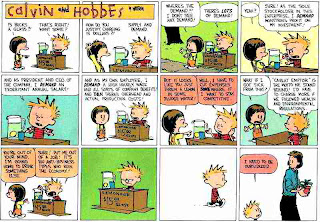Sarah Palin wrote an op-ed for the Washington Post today. I was originally planing on writing a short rebuttal, but after reading Conor Clarke's response (and follow-up) over at the Daily Dish, I don't see how I can really add anything to the conversation. In the article is one of the better (if not best) non-technical summaries of externalities that I've read in quite some time:
The point of cap and trade is to solve a problem of social cost: As an energy consumer, I am imposing a cost on society (pollution) that I do not take into account when I make the original decision to consume.
In this quote, Clarke is cuts through the political obfuscation of Palin's article, gets to the definition the words being used, and how these words apply to the topic at hand. As Palin's op-ed illustrate, political arguments in America consistently rely on emotional appeals driven by charged vocabulary; vocabulary which is embedded in decades old culture war debate. For example, inside language of Palin's article—the "Cap and Tax" epithet—is itself part of a clear attempt to 're-brand' the proposed energy plan with the 'tax-and-spend-liberals' narrative of American politics.
This is what is so frustrating about our nation discourse, not just on energy bills or general politics—this is an element of the country and culture as a whole. We place a greater emphasis on the appearance of things, and how these things fit into our pre-determined narratives and understandings; than on the realities and facts of a situation. It is because of this emphasis on appearances that Sarah Palin can write an opinion piece on energy policy, have it published in one of the country's major national newspapers, even though, as Derek Thomson (in another excellent appraisal of the op-ed) points out:
"Palin wrote a 700-word takedown of cap-and-trade that did not include the words pollution, emissions, carbon, or global warming."
It seems one doesn't need data, facts or a solid argument. Just a reasonable appeal to the traditional monsters that lie under the bed.


